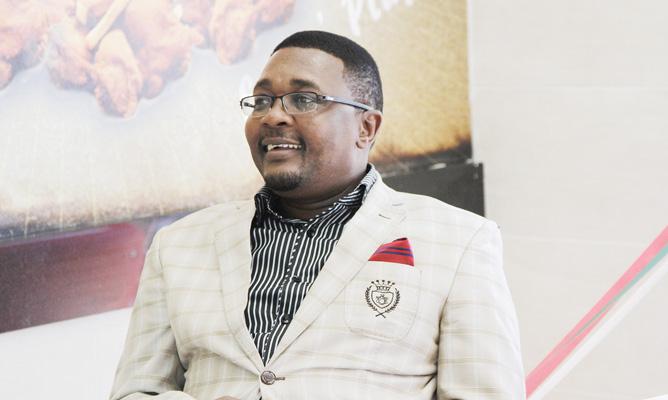News / Local
Mzembi says 'Zimbabweans are alone to remove Zanu-PF'
03 Nov 2024 at 10:26hrs |
0 Views

An exiled former Cabinet minister has issued a caution to Zimbabweans, urging them to take personal responsibility for voting out President Emmerson Mnangagwa's government rather than relying on foreign opposition figures for change. This warning follows a wave of optimism among Zimbabweans after the recent electoral victory of Botswana's opposition Umbrella for Democratic Change (UDC) candidate, Duma Gideon Boko, who was sworn in as the country's sixth president last Friday.
Walter Mzembi, who served as Foreign Affairs minister during the administration of the late former president Robert Mugabe, reflected on the broader implications of Botswana's elections, noting that while such victories may inspire hope, the political dynamics in Zimbabwe are significantly different. He highlighted that former Botswana president Mokgweetsi Masisi's loss can be attributed to his association with the unpopular Zanu-PF during the campaign.
"The greatest undoing of any personality or political party is to invite the visible and physical intervention of neighbours into internal political contestations," Mzembi stated. He emphasized that voters often resent foreign interference, which can undermine national sovereignty.
Despite the encouraging electoral results in Botswana, Mzembi urged Zimbabweans to remain grounded in reality. "Our elections are four years from now, and there is an attempt to stretch this to six years (2030) by the incumbent president," he cautioned, stressing the need for a strategic plan to address these challenges.
Recent internal conflicts within Zanu-PF, particularly regarding Mnangagwa's push to extend his tenure until 2030, have highlighted the precariousness of his position. Although Mnangagwa publicly denied intentions to extend his rule beyond the constitutional limits, Mzembi believes there remains a possibility that he could manipulate the political environment to prolong his incumbency.
The former minister also expressed skepticism about the potential for new democratic leaders, like Boko, to significantly impact the situation in Zimbabwe. "History tells us how even those we celebrate as 'democrats' quickly settle into the task of running their own countries," Mzembi warned, suggesting that Zimbabweans cannot depend solely on foreign leaders for salvation.
Retired opposition politician David Coltart echoed Mzembi's sentiments, underscoring the importance of leadership changes for genuine socio-economic progress. "Botswana has had five Presidents since 1980. Zimbabwe has had only two," Coltart remarked, comparing political leadership transitions to maintaining a car's engine. "If you don't change the oil frequently enough, the engine becomes gummed up and eventually fails."
In conclusion, both Mzembi and Coltart emphasized that the solution to Zimbabwe's ongoing challenges lies within the country itself. Mzembi proposed a comprehensive national dialogue as a potential path forward, questioning what would motivate stakeholders to come together when the urgency for change is not universally felt.
Walter Mzembi, who served as Foreign Affairs minister during the administration of the late former president Robert Mugabe, reflected on the broader implications of Botswana's elections, noting that while such victories may inspire hope, the political dynamics in Zimbabwe are significantly different. He highlighted that former Botswana president Mokgweetsi Masisi's loss can be attributed to his association with the unpopular Zanu-PF during the campaign.
"The greatest undoing of any personality or political party is to invite the visible and physical intervention of neighbours into internal political contestations," Mzembi stated. He emphasized that voters often resent foreign interference, which can undermine national sovereignty.
Despite the encouraging electoral results in Botswana, Mzembi urged Zimbabweans to remain grounded in reality. "Our elections are four years from now, and there is an attempt to stretch this to six years (2030) by the incumbent president," he cautioned, stressing the need for a strategic plan to address these challenges.
The former minister also expressed skepticism about the potential for new democratic leaders, like Boko, to significantly impact the situation in Zimbabwe. "History tells us how even those we celebrate as 'democrats' quickly settle into the task of running their own countries," Mzembi warned, suggesting that Zimbabweans cannot depend solely on foreign leaders for salvation.
Retired opposition politician David Coltart echoed Mzembi's sentiments, underscoring the importance of leadership changes for genuine socio-economic progress. "Botswana has had five Presidents since 1980. Zimbabwe has had only two," Coltart remarked, comparing political leadership transitions to maintaining a car's engine. "If you don't change the oil frequently enough, the engine becomes gummed up and eventually fails."
In conclusion, both Mzembi and Coltart emphasized that the solution to Zimbabwe's ongoing challenges lies within the country itself. Mzembi proposed a comprehensive national dialogue as a potential path forward, questioning what would motivate stakeholders to come together when the urgency for change is not universally felt.
Source - NewZimbabwe
Join the discussion
Loading comments…































